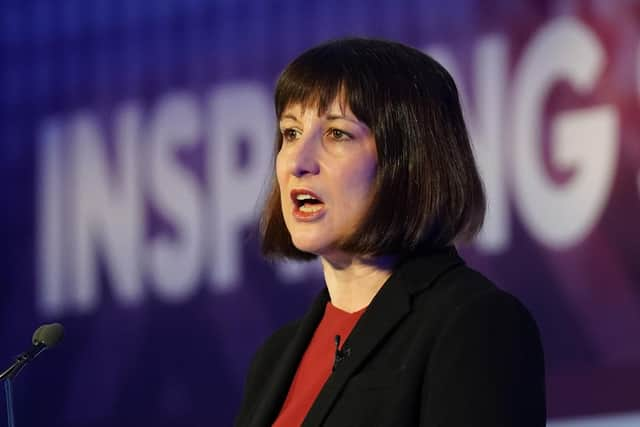Rachel Reeves: Labour ready to confront 'incredibly difficult situation'
Ms Reeves said the country needs new leadership to overcome the cost-of-living crisis, kickstart a stagnant economy and restore public services that are “on their knees” after years of austerity.
She said Labour would start by freezing council tax and then handing cash-strapped local authorities a share of £10bn, which would be raised by introducing a tougher windfall tax on oil and gas profits that is backdated and has “no loopholes”.
Advertisement
Hide AdAdvertisement
Hide Ad“The government is saying to local authorities ‘we're going to cut your grant but don't worry you can ask local ratepayers to pay more’,” she said. “That’s what’s happening because they haven’t got the money to run essential services like social care.”


The windfall tax on bumper profits made by oil and gas firms rose to 35 per cent in January, and will run until 2028, but companies are also allowed to claim tax savings worth 91p of every £1 invested in fossil fuel extraction in the UK.
“These are investments that businesses should be paying for. They shouldn't be getting tax breaks from the hard-pressed taxpayer,” said Ms Reeves.
The Government said an 3.26m are in fuel poverty, but it recently extended its energy support scheme, to keep typical household energy at £2,500 until June.
Advertisement
Hide AdAdvertisement
Hide AdMs Reeves, currently campaigning ahead of the local elections, welcomed the extension, but said millions of people need further support as they are struggling to keep up with rising mortgage and rent repayments and pay for food.
It comes after she met with debt advisors from StepChange Debt Charity in Leeds, who have seen a dramatic increase in demand over the last year.
People with mortgages and other loans have been warned the Bank of England is expected to increase its base rate of interest for the twelfth consecutive time in May – from 4.25 per cent to 4.5 per cent – in a bid to combat inflation.
It dropped to 10.1 per cent in the year to March, but food and non-alcoholic drink prices rose by 19.2 per cent – the sharpest increase in 45 years.
Advertisement
Hide AdAdvertisement
Hide AdSoaring energy costs have driven up the price of food production and transportation, while the war in Ukraine has disrupted global supplies and poor harvests in Europe and North Africa have reduced availability.
But Brexit has also inflated food prices by 6 per cent, by imposing trade barriers including additional customs checks between the UK and EU countries, according to a recent study by the London School of Economics.
“We need to have a better trading relationship with the European Union,” said Ms Reeves.
“We've created these trade barriers that make it harder to import from the rest of Europe into the UK and that is putting pressure on prices in the shops.
Advertisement
Hide AdAdvertisement
Hide Ad“One of the things that Labour has been calling for is a veterinary agreement, which would make it easier to buy and sell between the EU and the UK.”
The EU has signed these agreements with countries like Switzerland, to remove the need for time-consuming checks on animal products.
The British Retail Consortium, which represents supermarkets and other retailers, said food production costs peaked in October and they will begin to come down in the coming months.
“We absolutely need to work with the supermarkets and the suppliers to make sure that any falls in wholesale prices are actually passed on to consumers,” said Ms Reeves.
“Bills go up at the first sign of any pressure, but they don't seem to come down quite as quickly.”